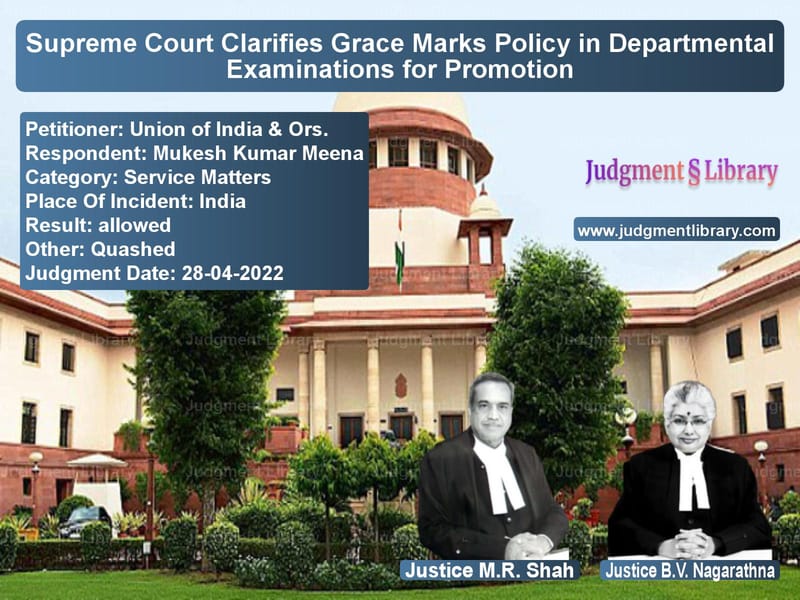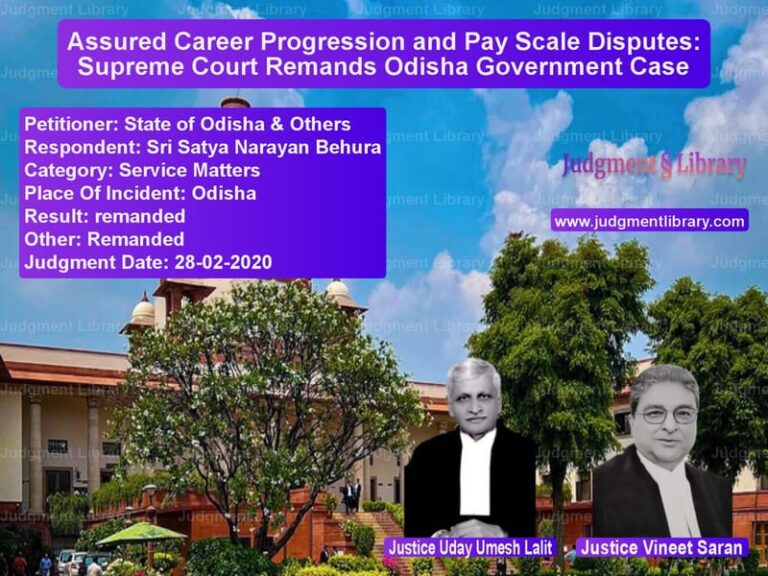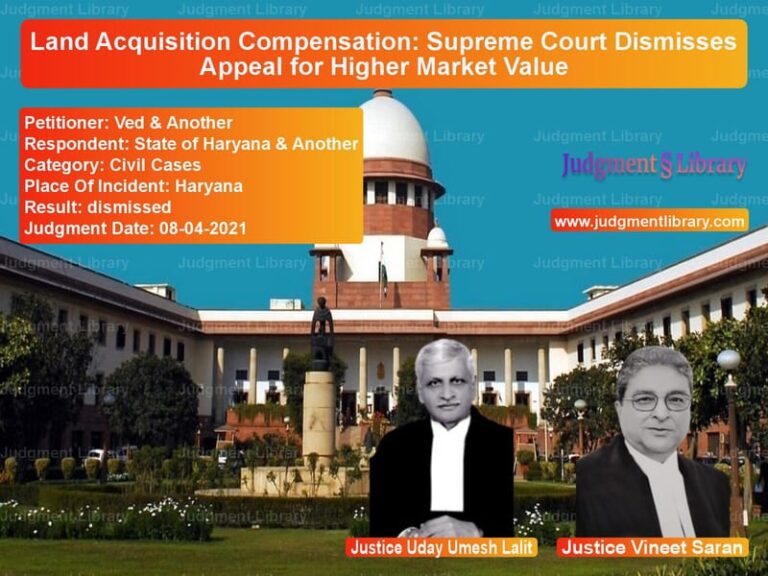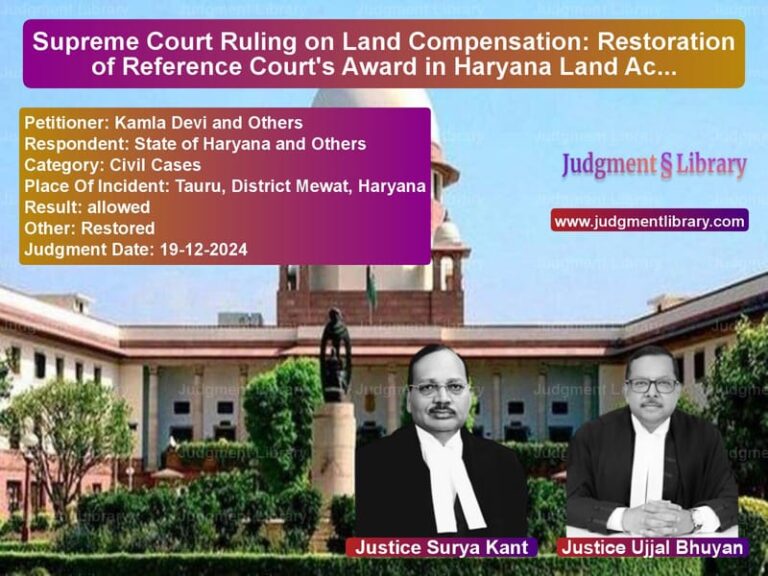Supreme Court Clarifies Grace Marks Policy in Departmental Examinations for Promotion
The case of Union of India & Ors. vs. Mukesh Kumar Meena revolves around the eligibility criteria and application of grace marks in departmental examinations for promotions within the Income Tax Department. The Supreme Court had to determine whether an employee from the Scheduled Tribes (ST) category, who had already passed under his reserved category, could claim additional grace marks to qualify under the general category for promotional benefits.
This judgment is significant as it settles an important question about the application of grace marks in government promotions and the principles of reservation in the selection process. The ruling clarifies that grace marks are meant to help failing candidates pass an examination and cannot be used to switch categories for promotional advantages.
Background of the Case
The respondent, Mukesh Kumar Meena, was a government employee who initially joined as a Lower Division Clerk in the Income Tax Department. Over time, he was promoted to the positions of Tax Assistant, Senior Tax Assistant, and Office Superintendent. To qualify for promotion to the post of Income Tax Inspector, employees were required to clear a departmental examination governed by the 1998 Departmental Examination Rules.
The examination comprised six subjects, with the following minimum marks criteria:
- General category: 45% in each subject
- Scheduled Castes (SC) and Scheduled Tribes (ST) category: 40% in each subject
The respondent appeared for the exam and secured the following marks:
| Subject | Marks Obtained | Minimum Passing Marks |
|---|---|---|
| Income Tax Law | 98 (49%) | 45% |
| Other Taxes | 43 (43%) | 40% |
| Book Keeping | 45 (45%) | 40% |
| Office Procedure | 71 (71%) | 40% |
| Examination of Accounts | 83 (83%) | 40% |
While he qualified under the ST category, he sought two additional grace marks in the subject of “Other Taxes” to reach 45% and be considered under the general category. This would have given him an advantage in the promotion process.
Legal Dispute and High Court’s Decision
The respondent filed a writ petition before the High Court, arguing that since other SC/ST candidates had been granted grace marks, he should also be allowed to receive two additional marks to qualify under the general category.
The High Court, relying on the precedent set in Rajesh Kumar Daria vs. Rajasthan Public Service Commission, ruled in favor of the respondent and directed the Central Board of Direct Taxes (CBDT) to grant him the grace marks.
Petitioners’ Arguments
The Union of India, represented by Shri Nachiketa Joshi, contended:
“The grace marks policy is meant to help marginally failing candidates pass the examination. It cannot be used to shift candidates from a reserved category to the general category.”
The key points raised were:
- Grace marks are provided only for candidates who fail the exam, not to enhance eligibility in a different category.
- The High Court misapplied the precedent in Rajesh Kumar Daria.
- Allowing additional grace marks would distort the reservation system and create unfair advantages.
- The respondent had already qualified under the ST category and did not require additional marks to pass.
Respondents’ Arguments
Senior Advocate Dr. Sumant Bhardwaj, appearing for the respondent, countered:
“Since the respondent only needed two marks to qualify under the general category, the principles of fairness and equality demand that grace marks be applied uniformly.”
He further argued:
- Other SC/ST candidates had been awarded grace marks even though they had already cleared the exam.
- The policy should be applied in a non-discriminatory manner.
- The High Court was correct in directing the authorities to award grace marks to the respondent.
Supreme Court’s Observations
The Supreme Court bench, comprising M.R. Shah and B.V. Nagarathna, overturned the High Court’s decision. The Court stated:
“Grace marks are provided only to enable marginally failing candidates to pass the examination. They are not meant to facilitate movement from a reserved category to the general category for promotional benefits.”
The Court emphasized:
- The respondent had already passed under the ST category.
- Granting additional marks to shift him to the general category would be contrary to the policy.
- The High Court misapplied the precedent set in Rajesh Kumar Daria.
Final Judgment
The Supreme Court set aside the High Court’s ruling and restored the Central Administrative Tribunal’s decision, which had rejected the respondent’s claim for additional grace marks. The judgment concluded:
- The purpose of the grace marks policy is only to help failing candidates pass.
- Once a candidate has passed under their respective category, no further grace marks can be awarded.
- The High Court erred in directing the Union of India to extend grace marks.
Conclusion
This ruling reinforces the principle that grace marks are only meant for failing candidates and cannot be used to switch categories. It also clarifies that promotions within government departments must adhere to established reservation policies and cannot be altered by judicial intervention. The decision upholds the integrity of the reservation system and ensures that grace marks are used as intended—to help marginally failing candidates pass, not to provide an unfair advantage in promotions.
Petitioner Name: Union of India & Ors..Respondent Name: Mukesh Kumar Meena.Judgment By: Justice M.R. Shah, Justice B.V. Nagarathna.Place Of Incident: India.Judgment Date: 28-04-2022.
Don’t miss out on the full details! Download the complete judgment in PDF format below and gain valuable insights instantly!
Download Judgment: union-of-india-&-ors-vs-mukesh-kumar-meena-supreme-court-of-india-judgment-dated-28-04-2022.pdf
Directly Download Judgment: Directly download this Judgment
See all petitions in Promotion Cases
See all petitions in Public Sector Employees
See all petitions in Judgment by Mukeshkumar Rasikbhai Shah
See all petitions in Judgment by B.V. Nagarathna
See all petitions in allowed
See all petitions in Quashed
See all petitions in supreme court of India judgments April 2022
See all petitions in 2022 judgments
See all posts in Service Matters Category
See all allowed petitions in Service Matters Category
See all Dismissed petitions in Service Matters Category
See all partially allowed petitions in Service Matters Category







